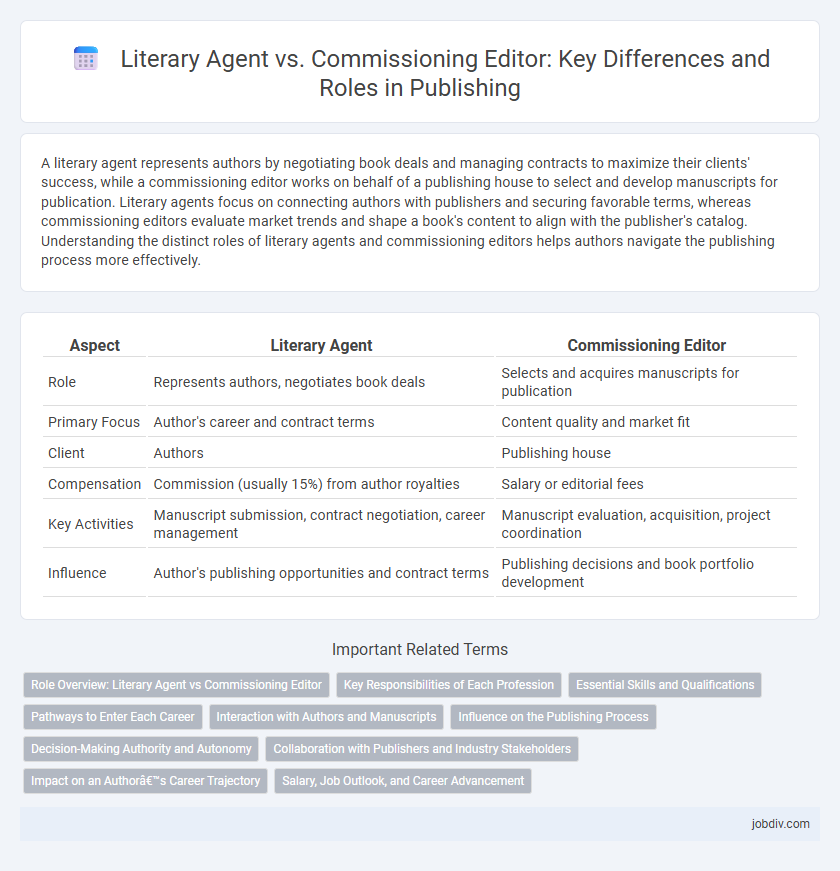A literary agent represents authors by negotiating book deals and managing contracts to maximize their clients' success, while a commissioning editor works on behalf of a publishing house to select and develop manuscripts for publication. Literary agents focus on connecting authors with publishers and securing favorable terms, whereas commissioning editors evaluate market trends and shape a book's content to align with the publisher's catalog. Understanding the distinct roles of literary agents and commissioning editors helps authors navigate the publishing process more effectively.
Table of Comparison
| Aspect | Literary Agent | Commissioning Editor |
|---|---|---|
| Role | Represents authors, negotiates book deals | Selects and acquires manuscripts for publication |
| Primary Focus | Author's career and contract terms | Content quality and market fit |
| Client | Authors | Publishing house |
| Compensation | Commission (usually 15%) from author royalties | Salary or editorial fees |
| Key Activities | Manuscript submission, contract negotiation, career management | Manuscript evaluation, acquisition, project coordination |
| Influence | Author's publishing opportunities and contract terms | Publishing decisions and book portfolio development |
Role Overview: Literary Agent vs Commissioning Editor
Literary agents represent authors, negotiating contracts and securing publishing deals to maximize their clients' financial and creative interests. Commissioning editors work within publishing houses, evaluating manuscripts, acquiring rights, and guiding the editorial process to develop market-ready books. Both roles are crucial in the publishing ecosystem, with agents advocating for authors and commissioning editors shaping the publisher's catalog.
Key Responsibilities of Each Profession
Literary agents primarily focus on discovering authors, negotiating book deals, and managing rights sales to maximize an author's publishing success and income. Commissioning editors evaluate manuscript proposals, decide which projects to acquire, and oversee the editorial process to ensure marketable and high-quality publications. Both roles are crucial in the publishing industry, with agents advocating for authors and commissioning editors shaping and curating the publisher's catalog.
Essential Skills and Qualifications
Literary agents excel in contract negotiation, market knowledge, and author representation, requiring strong networking abilities and a deep understanding of publishing trends. Commissioning editors prioritize editorial expertise, project management, and content curation, often holding advanced degrees in literature or publishing coupled with experience in manuscript evaluation. Both roles demand exceptional communication skills, industry insight, and the ability to identify commercially viable content.
Pathways to Enter Each Career
Aspiring literary agents often begin their careers with experience in publishing houses, literary agencies, or as writers, building strong networking skills and knowledge of market trends to attract and represent authors effectively. Commissioning editors typically enter the field through backgrounds in publishing, journalism, or English literature, gaining expertise in acquiring manuscripts that align with their publisher's list and audience preferences. Both roles require a passion for storytelling and negotiation, but literary agents lean more on author advocacy and rights management, while commissioning editors focus on content selection and development within publishing firms.
Interaction with Authors and Manuscripts
A literary agent acts as the intermediary between authors and publishers, managing contract negotiations and guiding manuscript development to maximize the author's market potential. A commissioning editor works within a publishing house, evaluating manuscripts for acquisition, shaping editorial direction, and coordinating the publication process to align with the publisher's catalog. Both roles are crucial in manuscript selection and author collaboration but operate at different stages of the publishing workflow.
Influence on the Publishing Process
Literary agents play a crucial role in the publishing process by advocating for authors, negotiating contracts, and guiding manuscript development to secure favorable deals with publishers. Commissioning editors directly influence the selection and acquisition of titles, shaping the publisher's catalog by evaluating market trends, reader interests, and editorial fit. Both positions significantly affect a book's journey from manuscript to market, but agents primarily serve the author's interests while commissioning editors represent the publisher's vision.
Decision-Making Authority and Autonomy
Literary agents hold significant decision-making authority by selecting manuscripts to represent and negotiating contracts on behalf of authors, demonstrating considerable autonomy in guiding an author's career. Commissioning editors possess the authority to approve or reject manuscripts for publication within a publishing house, operating with autonomy constrained by the company's strategic goals and editorial policies. Both roles influence the publishing process, but literary agents typically exercise greater independence in advocating for the author's interests.
Collaboration with Publishers and Industry Stakeholders
Literary agents serve as intermediaries between authors and publishers, leveraging industry networks to negotiate publishing contracts and secure favorable terms. Commissioning editors collaborate closely with publishers and creative teams to select and develop manuscripts that align with market trends and publishing goals. Both roles require effective communication and coordination with agents, editors, and marketing professionals to ensure successful book production and distribution.
Impact on an Author’s Career Trajectory
A literary agent plays a crucial role in an author's career trajectory by securing book deals, negotiating contracts, and managing rights, which directly affects an author's financial success and market reach. A commissioning editor influences an author's development by selecting and refining manuscripts, shaping the work's editorial direction, and determining its fit within a publisher's catalog, thus impacting the book's quality and commercial potential. Both professionals are essential in different phases of the publishing process, collectively enhancing an author's visibility, credibility, and long-term career growth.
Salary, Job Outlook, and Career Advancement
Literary agents typically earn a commission of 15% on authors' earnings, with salaries ranging widely based on client success, while commissioning editors often draw fixed salaries averaging between $50,000 and $90,000 annually in traditional publishing houses. The job outlook for literary agents is tied to the fluctuating book market and author demand, whereas commissioning editors benefit from more stable employment prospects within established publishing firms. Career advancement for literary agents involves building a reputable client list and expanding industry connections, while commissioning editors can progress to senior editorial roles or publishing director positions through demonstrated expertise in acquisition and market trends.
Literary Agent vs Commissioning Editor Infographic

 jobdiv.com
jobdiv.com